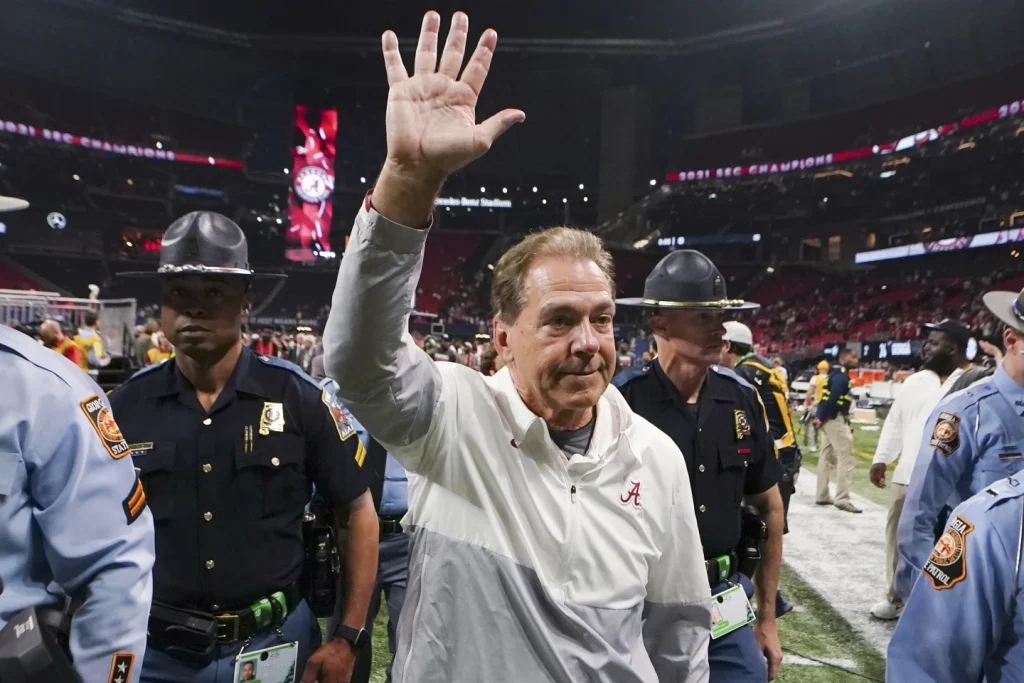Nick Saban, the iconic figure behind the unparalleled success of the Alabama Crimson Tide, has announced his retirement, marking the end of an era in college football.
Saban’s legacy, however, will forever be etched in the annals of the sport, as his unparalleled dominance and transformative impact on the game have left an indelible mark.
Throughout his illustrious career, Saban achieved the extraordinary feat of winning seven national championships, a record unmatched by any other major college football coach.
His tenure at Alabama saw the revival of a once-dominant program, as he propelled the Crimson Tide to the summit of college football, securing six national titles in a span of 17 seasons.
Saban’s legacy extends far beyond mere victories; his influence and impact have transcended the boundaries of the gridiron, elevating him to a revered status akin to royalty within the state of Alabama.
Upon assuming the helm of the Crimson Tide in 2007, Saban undertook the monumental task of restoring the program’s former glory, which had been epitomized by the legendary Paul “Bear” Bryant.
Through his unwavering commitment and strategic prowess, Saban orchestrated a remarkable resurgence, firmly establishing Alabama as a perennial powerhouse in college football.
As his triumphs accumulated, Saban’s stature transcended the realm of sports, elevating him to the status of a revered figure whose influence extended far beyond the football field.
Saban’s decision to step away from coaching has reverberated across the college football landscape, signaling the conclusion of a remarkable career that has not only yielded numerous championships but also served as a catalyst for the ascension of coaching luminaries such as Georgia’s Kirby Smith, Texas’ Steve Sarkisian, and Mississippi’s Lane Kiffin.
His departure marks the end of an epoch defined by unparalleled success and enduring impact, leaving an irreplaceable void in the sport that will be felt for years to come.
While Alabama has yet to formally announce Saban’s retirement, the sentiments expressed by his wife, Terry Saban, on the Facebook page for Nick’s Kids Foundation encapsulate the profound impact of their tenure at Alabama.
Terry Saban’s reflections on the “incredible run” at Alabama underscore the enduring legacy of Saban’s tenure, emphasizing the profound impact on the lives of countless individuals and the unwavering commitment to philanthropic endeavors.
The continuation of the Nick’s Kids Foundation serves as a testament to the enduring legacy of the Sabans, highlighting their unwavering dedication to fostering positive change and making a meaningful difference in the lives of children, students, and teachers across the state of Alabama.
As the college football landscape undergoes a seismic shift with the departure of a coaching titan, the enduring legacy of Nick Saban will endure as a testament to his unparalleled impact on the sport.
His storied career, marked by unprecedented success and unwavering commitment to excellence, has left an indelible imprint on the fabric of college football, ensuring that his influence will resonate for generations to come.
While the end of Saban’s coaching reign may signal the conclusion of an era, his legacy will forever endure, serving as a timeless reminder of the transformative power of unwavering dedication, resilience, and the pursuit of excellence.
Nick Saban, the legendary coach of the University of Alabama’s football team, has left an indelible mark on the sport.
His dedication to the game, unwavering work ethic, and commitment to excellence have set a standard that transcends the ever-changing landscape of football.
The words he spoke encapsulate not only his own philosophy but also the timeless principles that define success in any endeavor.
The essence of hard work, discipline, and the relentless pursuit of a worthy goal forms the bedrock of Saban’s coaching legacy.

Saban’s tenure at Alabama was nothing short of remarkable. Despite a shaky start in his final season, he led the Tide to a Southeastern Conference championship and a coveted spot in the College Football Playoff.
His track record speaks volumes, with nine SEC championships and multiple national titles under his belt. The 14-0 season in 2009 marked a historic milestone, and subsequent triumphs in 2011, 2012, 2015, 2017, and 2020 solidified his status as one of the greatest coaches in college football history.
Beyond the accolades and championships, Saban’s impact extends far beyond the scoreboard. His emphasis on doing things the right way and the pursuit of constant personal improvement has left an indelible mark on the players he mentored and the sport as a whole.
The values he instilled in his team transcended mere athletic achievement, shaping individuals into better versions of themselves both on and off the field.
Saban’s journey at Alabama was not without its challenges. A 7-6 debut campaign in 2007 tested his resolve, but it was his unwavering commitment to excellence that ultimately defined his legacy.
His ability to consistently win at least 10 games for 16 consecutive seasons is a testament to his unparalleled leadership and coaching prowess.
The emergence of formidable opponents such as Dabo Swinney’s Clemson teams and the Georgia Bulldogs led by Smith posed new challenges for Saban and the Tide.
However, his enduring commitment to the process and the values he espoused ensured that Alabama remained a force to be reckoned with, regardless of the competition.
Saban’s impact extends beyond the confines of the football field. His influence on the sport has reshaped the way coaches approach the game and has set a standard for excellence that transcends generations.
His legacy will forever be intertwined with the storied history of Alabama football, and his mantra of “Roll Tide” will continue to resonate with fans for years to come.
In conclusion, Nick Saban’s illustrious career at the University of Alabama serves as a testament to the enduring power of hard work, discipline, and the relentless pursuit of excellence.
His unwavering commitment to doing things the right way, coupled with a relentless pursuit of personal and collective improvement, has solidified his status as a coaching icon.
While the rules of football may change, the timeless principles that Saban embodies will continue to serve as a guiding light for future generations of athletes, coaches, and fans alike.
Alabama will forever remain “Sweet Home” to Saban and his family, and the echoes of “Roll Tide” will reverberate through the annals of college football history.
The recent announcement of Nick Saban stepping away from college football has sparked widespread discussion and reflection on the state of the sport.
As the fabric of college football undergoes dramatic change, with players now able to profit from their on-field performances, the departure of a figure as influential as Saban marks a significant milestone in the evolution of the game.
Deion Sanders, the head coach of Colorado, expressed the sentiment shared by many when he stated that “College Football just lost the GOAT.”
Saban’s impact on the sport cannot be overstated. His journey includes a two-year stint in the NFL with the Miami Dolphins before returning to college football to revitalize one of its most storied programs.
With an impressive record of 297-71-1 as a college head coach, Saban’s coaching career spans notable stops at Toledo, Michigan State, and LSU, where he secured a national title.
However, it was at Alabama where he solidified his status as one of college football’s greatest coaches.
During his tenure at Alabama, Saban achieved remarkable success, coaching the team’s first four Heisman Trophy winners and producing numerous NFL players.
His winning percentage of 87.7%, with a record of 206-29, underscores the unparalleled dominance of his teams. Notably, his coaching prowess resulted in 44 first-round draft picks, including the highly touted quarterback Bryce Young.
Saban’s adaptability to the changing landscape of college football is evident in his ability to transition from winning with formidable defenses to producing high-scoring teams equipped to counter up-tempo offenses.
Moreover, he navigated the introduction of new rules surrounding Name, Image, and Likeness (NIL) and player transfers, showcasing his ability to evolve with the sport.
His coaching career is marked by a series of achievements, including leading Toledo to a Mid-American Conference championship in 1990 and guiding Michigan State to multiple bowl games before securing a national title with LSU in 2003.
Tom Izzo, the head coach of Michigan State’s basketball team and a close friend of Saban, aptly described him as “the greatest coach in the history of football,” emphasizing the unparalleled consistency and resilience that defined Saban’s tenure.
Saban’s most recent season with Alabama was a testament to his enduring impact. Overcoming early-season adversity, including a loss to Texas, the team rallied behind the emergence of quarterback Jalen Milroe to secure a stunning victory over then-No. 1 ranked Georgia in the SEC championship game.
Despite not clinching the national title, Saban’s pride in his team’s achievements was evident, underscoring the remarkable journey they had undertaken.
In his reflections on the season, Saban expressed a desire to have done more to support his team, highlighting the enduring commitment and passion that has defined his coaching philosophy.
His departure, though unexpected, serves as a poignant reminder of the inevitable passage of time and the ever-changing nature of college football.
As the sport continues to evolve, Saban’s legacy will endure as a testament to his unparalleled impact on college football.

His departure marks the end of an era, prompting a collective introspection on the evolution of the game and the enduring influence of a coach whose contributions have left an indelible mark on the sport.
As college football enters a new chapter, the departure of a figure as iconic as Nick Saban serves as a catalyst for reflection, appreciation, and anticipation of the future of the game.
